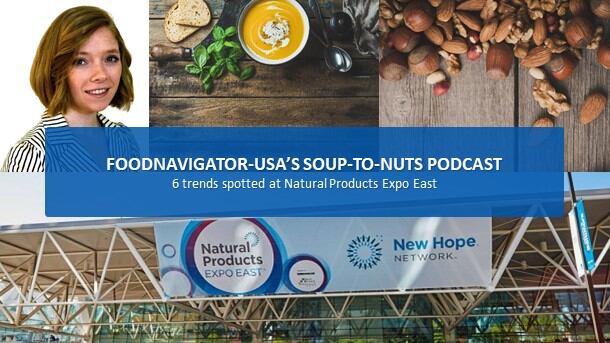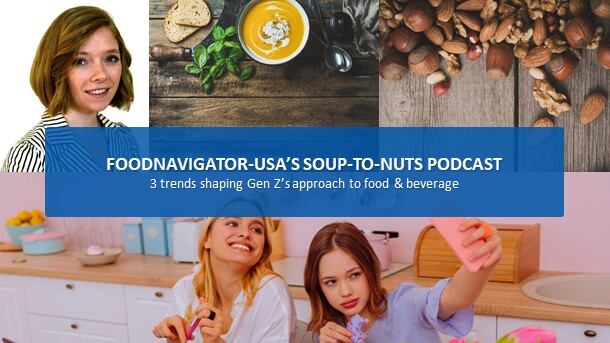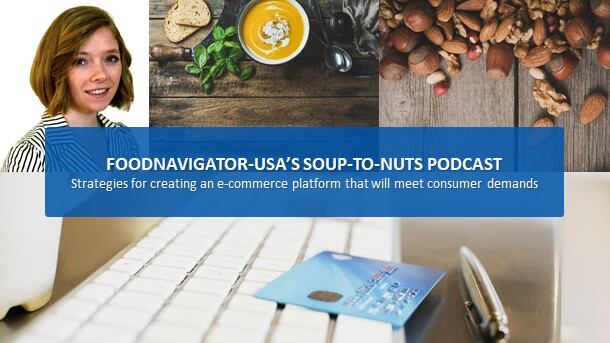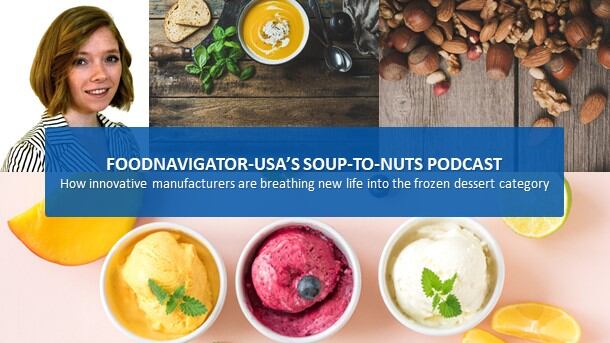Other ingredients and themes that stood out on the show floor were creative uses for cauliflower, dairy-free frozen desserts, and all things keto. In addition, a few trends that popped up on the retail side that likely will impact brands in the future, if not already, include a push to bring in more brands that “do good,” and that have a strong digital presence.
In this episode of FoodNavigtor-USA’s Soup-To-Nuts podcast, we explore each of these trends will help from brands operating in the space and from the online platform RangeMe, which pairs retailers with brands.
[Editor's note: Make sure you never miss an episode of FoodNavigator-USA's Soup-To-Nuts podcast, by subscribing to us on iTunes.]
Hemp and CBD
Likely surprising no one, hemp and CBD continued to steal the spotlight from other rising ingredients at Expo East, despite a murky regulatory landscape.
Despite a murky regulatory landscape, hemp and CBD continued to steal the spotlight at Expo East, where there was even a dedicated – and age restricted – pavilion for brands offering products with the ingredients.
The current enthusiasm for hemp and CBD traces back, in part to the passage of the most recent Farm Bill in 2018, which legalized commercial production of hemp, which cracked the door for more robust production of the crop as long other state and federal barriers are cleared first.
But this isn’t the only reason that brands and consumers have zeroed in on hemp and CBD as hot ingredients to include in products across categories. According to Anne Thompson, the vice president of marketing for Manitoba Harvest, a major attraction for hemp is its nutritional profile and the synergies it brings to other trends, including plant-based, grain-free and other emerging diets.
“If you think of hemp seeds as kind of the wild salmon of the plant world – so high in protein, about double the protein of chia or flax seed, 25% more omega-3 and -6,” combined with an absence of known allergens and a “pretty low carb load,” you can see why hemp is “fabulous,” she said.
Recognizing that most mainstream consumers won’t want to eat hemp seeds on their own or over a salad, Manitoba Harvest is incorporating them in granola, bars and other easier-to-eat formats.
Manitoba Harvest also recently entered the CBD side of the business with a broad spectrum hemp extract, which Thompson said consumers were asking it for because they respect the company’s 21 year history working with hemp and CBD and its strict standards for handling the ingredient. The trust that many consumers place in the brand has empowered it to also provide additional much-needed consumer education.
While most of Manitoba Harvest’s CBD products are labeled as dietary supplements, its CBD-infused protein powder is not. Thompson explained the company’s decision to include the ingredient in a food product, despite FDA officials repeatedly saying that CBD is not approved for use in food & beverage, comes down to the company’s rigorous approach to testing and that it obtained self-affirmed GRAS status for its ingredient.
Not all food companies are as comfortable as Manitoba Harvest when it comes to working with CBD, but they are embracing hemp, which is solidly in play for foods. Among those companies is Once Again Nut Butters, which the company’s marketing communications and PR manager Gael Orr explained recently launched a Sunflower Hemp Butter.
“A lot of people are looking to consume more hemp because hemp is naturally rich in vitamin E and is rich with omega-3s,” which pairs well with sunflower butter’s high vitamin E content, she explained.
She also noted the sunflower butter has a “very robust taste” that masks the earthiness of hemp, which some consumers don’t like – making the ingredient more accessible.
Orr added that the company considered – but rejected – the idea of adding CBD to one of its nut or seed butters because it is not technically approved by FDA for use in food. She also expressed concern that when CBD is added to a food it is harder to control the “dose” because most people don’t think of limiting a food to a specific amount per day.
Controversy aside, Manitoba Harvest’s Thompson predicts that current frenzy surrounding both of these ingredients is just the beginning and demand for both will continue to grow.
Keto claims continue to multiply
Almost as prolific as CBD and Hemp at Expo East, were keto claims on products across all categories. But one of the more surprising places to see the claim was on bread, which on the surface appears to be the antithesis of the low-carb, high-fat, high-protein ketogenic diet.
But the founder of the startup Unbun, Gus Klemos, found a way to make better-for-you breads that were certified keto, paleo, grain-free and gluten-free but that also behave and taste like their traditional flour-based counterpart.
He explained that after years of eating hamburgers on a lettuce bun he began experimenting in his kitchen to see if he could create a bun that fit his lifestyle, which leaned heavily towards keto, paleo, grain-free and other low-glycemic foods. After tinkering with recipes for a year, Klemos said he went to a local burger joint to see if it would be interested in his buns and after eating one bun the manager placed an order for a thousand more, which sold out in three or four days.
At this point, Klemos said he was simply offering the buns as a better-for-you version of bread, but as his business started to grow he quickly realized that attaching consumer-friendly descriptors to his bread could help take sales to the next level.
This strategy seems to be working, given the young brand’s rapid growth.
“We increased our footprint 20 times in eight months,” and the bread is gaining traction in foodservice, he said.
Cauliflower craze
Another popular ingredient that popped-up in products launching or showcasing at Expo East was cauliflower, which showed up across categories in various formats. For example, the veggie is the based for baby food company Lil’ Gourmet’s new Organic Coconut Cauliflower Mash, Lilly’s Keto-Cauliflower Hummus, Real Food From the Ground Up’s crunchy Cauliflower Stalks savory chips, Veggiecraft Cauliflower Spaghetti and others.
Lauren Archibald, the marketing manager of Hippie Snacks, which uses the veggie as the base for its Cauliflower Crisps, shared what makes the cruciferous so appealing.
“Cauliflower is definitely having its moment right now,” she said. “There’s the rise of so many low-carb diets, paleo, keto, and … people are always looking for carb alternatives that are not using grains or starches and cauliflower is a really great substitute for that because it has such great structure and substance and also taste.”
Whenever an ingredient, like cauliflower hits it big, there will companies that include only a smattering of it in their recipe just so they can call it out on their packaging. But this is not the case for Hippie Snacks, which Archibald proudly explained uses real cauliflower as the first ingredient.
“We’re actually taking whole heads of fresh cauliflower and grinding them up with other super clean, real food ingredients, all of which you can pronounce,” she said.
Plant-based demand fuels growth of non-dairy frozen desserts
Cauliflower’s rise also is being fueled by the larger plant-based macro-trend, which was prominent at Expo East as it has been at most major shows for the past few years. But within this larger trend, were advances in the frozen dessert segment. New entrants in the space offered soft, indulgent alternatives to ice cream, which are a far cry from some of the early entrants to the category that tend to be icy and difficult to scoop.
One of the notable newcomers to the space is O’MY Dairy Free Gelato, which company co-founder Julie Bishop described as a dessert designed to be savored and shared, rather than devoured a pint at a time.
“What makes us different is that the creamy texture and not being afraid of having a full fat product…. We are kind of the opposite of taking a whole pint and eating it by yourself. We want it to be enjoyed together,” she said.
The brand also stands apart from other plant-based competitors because of its clean ingredient deck and allergy-friendly positioning, which Bishop suggested reinforces the brand’s emphasis on sharing.
Two trends influencing retailers’ stocking decisions
Stepping back from category- or product-specific trends, an emerging macro trend that likely will touch all food and beverage players in the near future is a rising demand among retail buyers for brands – both new and established – to have a strong digital presence.
Brandon Leong, the VP of marketing and growth at the online sourcing platform RangeMe, explained that retail buyers increasingly are evaluating brands’ online marketing strategy when deciding whether to stock them on store shelves.
“The biggest trend moving right now … is digital. In the past year, brands are starting to finally realize – both established and young – that if they don’t go digital .. .if they are not marketing outside of the physical marketing, if they’re not scaling what they do, scaling their story, they are going to find it very difficult one, to continue penetrating the market they are in, and then two, being able to get the attention of the people they want, like buyers,” he said.
He explained that buyers manage a lot of SKUs and increasingly are unwilling to take brands that have not proven their ability to sell.
He also notes retailers increasingly are looking to stock brands and companies that are ‘doing good.’
“A lot of our retail partners are starting to talk about … brands with heart, brands with purpose, things like that,” he said, adding that stores like to group these products together for impactful displays that attract younger consumers who shop in part based on their values.




